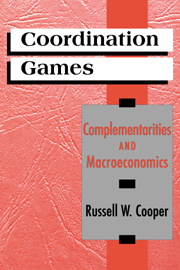Book contents
7 - Government Policy
Published online by Cambridge University Press: 02 December 2009
Summary
In this final section of the book we are interested in studying the problem of policy determination between a government and a set of private agents. The inefficiencies created by the presence of external effects as well as the prospects of multiple equilibria studied in the previous chapter set the stage for a consideration of government intervention to resolve these problems. Thus this topic is a natural conclusion to our study of macroeconomic complementarities.
The starting point of the chapter is an illustration of the coordinating power of the government. If coordination problems reflect the inability of agents to select the Pareto-optimal (optimistic) Nash equilibrium, then the government may be able to take actions to achieve the desired outcome. As we shall see, the government's actions can eliminate some undesirable equilibria by turning the strategies that support them into dominated strategies. These policies can be thought of as “confidence building measures” that work by eliminating the pessimistic beliefs that support the Pareto-inferior (pessimistic) Nash equilibria.
One important theme here is that in the optimistic equilibrium, the government never takes an action. Instead, its commitment to an action is sufficient for stabilization through removal of the pessimistic equilibrium. Thus governments may appear to be doing “nothing” when, in fact, they are quite successful.
To illustrate, we study the Diamond and Dybvig [1983] model of bank runs and the role of the government in supporting the Pareto optimal equilibrium through the creation of deposit insurance.
- Type
- Chapter
- Information
- Coordination Games , pp. 126 - 150Publisher: Cambridge University PressPrint publication year: 1999



